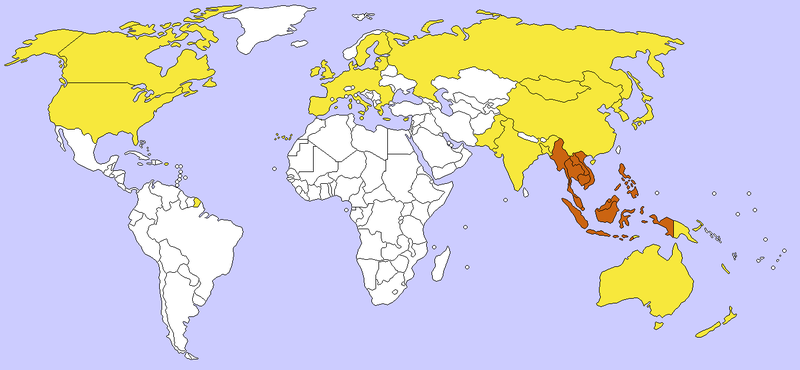Headline
Regional security talks: South China Sea, Myanmar likely to be discussed at weekend forum

Map indicating ASEAN Regional Forum participants. The European Union is shown without internal borders because it participates as a single entity in the forum. Image from Wikimedia Commons.
NAYPYITAW, Myanmar—U.S. Secretary of State John Kerry and top diplomats from Europe and Asia are meeting to discuss regional security issues this weekend. The meeting opened Friday for talks among ministers from 10 Southeast Asian countries and expands over the weekend to comprise 27 countries who are members of the so-called ASEAN Regional Forum, including the United States, Russia, China, India, South Korea and North Korea. Here are things to watch for:
Disputes with China
Territorial disputes over the South China Sea threaten to turn every regional meeting into a tug-of-war between China’s allies and critics. This round comes after China deployed a deep-sea oil rig for two months near islands claimed also by Vietnam. China’s withdrawal of the rig in mid-July removed an irritant but left a legacy of anger and strained relations with Vietnam and raised questions among China’s other neighbours about its long-term strategy. The U.S. and several Southeast Asian countries will be looking to calm tensions stoked by the rig and will push for a freeze in actions that change the status quo, officials say, such as seizing unoccupied islands and land reclamation. Chinese officials have already made clear they don’t support the proposal. China claims virtually the entire South China Sea and resents what it sees as U.S. meddling in its affairs. The other claimants include the Philippines, which is a U.S. treaty ally, Taiwan, Malaysia and Brunei. China has a separate territorial conflict with Japan in the East China Sea, which could come up between their ministers. Japan angered China last week by assigning names to five small islands that are part of a cluster which both nations claim.
The American factor
Kerry has a variety of topics on his agenda, including the South China Sea and U.S.-Myanmar relations and the possibility for discussions on North Korea and Ukraine, if meetings with his counterparts from Russia and North Korea occur on the sidelines. The South China Sea is of tremendous strategic importance to Washington and others because one-third of the world’s shipping transits through its waters and huge oil and gas reserves are believed to be beneath the seabed. Although the U.S. claims neutrality in the disputes, China is unlikely to respond favourably. Separately, Kerry’s aides say he will press Myanmar’s leaders to apply greater safeguards for human rights and will be gauging the former pariah nation’s preparations for 2015 elections. Last week, more than 70 U.S. lawmakers warned of worsening conditions in Myanmar including anti-Muslim discrimination and violence, and urged the Obama administration to sanction those complicit in abuses and atrocities. The lawmakers also urged Obama not to make further concessions to the reformist government unless there’s significant progress.
Myanmar’s bumpy road
When Myanmar was awarded the rotating chairmanship of ASEAN, it was hailed as one of many firsts for the country that ended a half-century of military rule in 2011. But missteps in the country’s transition to democracy are likely to be raised this weekend and cause embarrassment to the host country.
Western countries are expected to question ongoing sectarian violence and allegations that President Thein Sein’s government has catered to and stoked anti-Muslim sentiment among the majority Buddhist population. The U.S. and others say they will voice concern about military abuses against ethnic minorities, the recent jailing of journalists and the need for constitutional reform. There is also the big question over whether opposition leader Aung San Suu Kyi will be allowed to run for the presidency next year and complete a Mandela-like transformation from former political prisoner to head of state. Currently, Suu Kyi is ineligible to be president because she was married to a foreigner.
North Korean questions
Talks aimed at ending North Korean’s nuclear weapons program have been stalled since 2008, and, since then, North Korea has conducted nuclear and long-range rocket tests and last year threatened Washington and Seoul with nuclear war. Top diplomats from the countries involved in the negotiations will be in attendance, and there has been some speculation in South Korean media that the foreign ministers of the rival Koreas could meet.
Nuclear matters could come up, media in Seoul said, but the focus of any sideline talks by the Koreas may be North Korea’s participation in the upcoming Asian Games, hosted by the South. South Korea’s Foreign Ministry has reportedly said no decision has been made on any meeting.
The participants
The ASEAN Regional Forum was established in 1994. Among the other officials attending: China’s foreign minister Wang Yi; North Korean’s Ri Su Yong and Yun Byung-se of South Korea; Japan’s Fumio Kishida and Deputy Foreign Minister of Russia Igor Morgulov.
Associated Press writers Jocelyn Gecker in Bangkok and Jim Gomez in Manila, Philippines, contributed to this report.





















